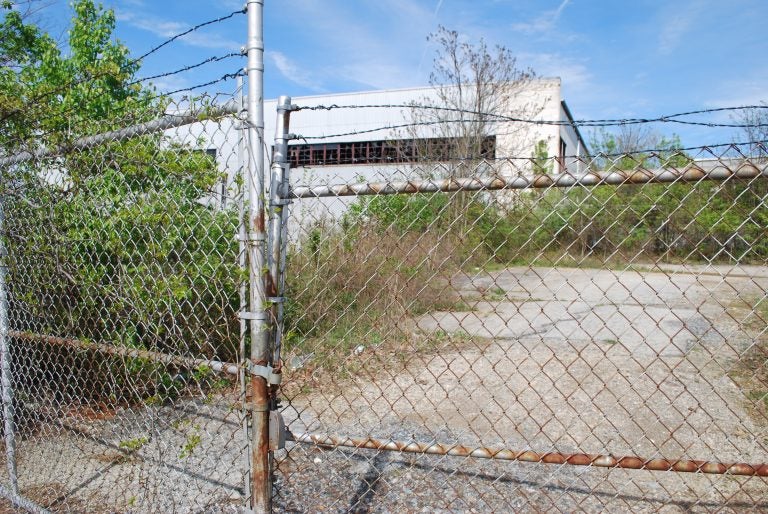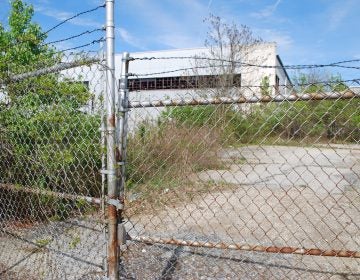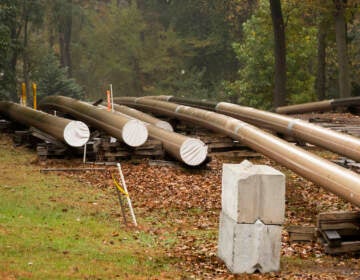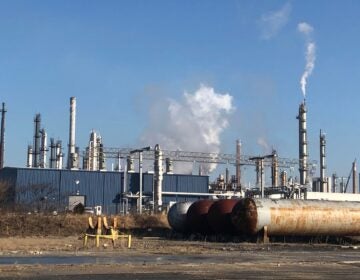DEP plan to clean up Bishop Tube site contamination draws criticism from environmentalists
Environmental advocates are speaking out against a Pa. DEP plan to clean up decades-old contamination at the site of the former Bishop Tube facility in East Whiteland Township
Listen 1:25
The contaminated Bishop Tube former industrial site in Malvern, Pa. Environmentalists say DEP has neglected the cleanup over many years. (Jon Hurdle/StateImpact PA)
Environmental advocates are speaking out against a Pennsylvania Department of Environmental Protection plan to clean up decades-old contamination at the site of the former Bishop Tube facility in East Whiteland Township, Chester County.
The site is contaminated with the chemical compound, trichloroethylene (TCE), which can cause serious health problems for people exposed. DEP’s plan, submitted Wednesday, involves the use of chemical oxidants to destroy TCE. The move follows almost a year-long public comment process.
Environmental advocates have previously called for the site to be converted to natural open space, and have also spoken out against a developer that wants to build townhomes on the property. Now that the township has granted preliminary approval for development, opponents say DEP’s cleanup doesn’t go far enough to protect potential future residents.
“We have people who have suffered very serious health ramifications, that they have good reason to believe are the result of exposure to this site — both people who work at the site, but also neighboring residents,” said Maya van Rossum of the Delaware Riverkeeper Network, an organization that has advocated against the redevelopment plans.
“There most certainly are property value ramifications from being located next to a toxic site of this kind,” she added. “And yet, this proposal, besides falling way short, spends a lot more time worrying about what it’s going to cost the responsible parties than what are the impacts for the current neighboring residents, for the environment, and for potential future residents if this site actually is allowed to be developed for residential use.”
Several businesses manufactured stainless steel tubes at the 13.7-acre Bishop Tube site from the 1950s until 1999, contributing to various kinds of contamination. But, officials are most concerned about TCE. The commercial-grade solvent was commonly used as a degreasing agent for manufactured metal parts. Prolonged exposure to TCE can cause neurological, cardiac, reproductive, and developmental health problems.
In 2022, DEP also reported concerning levels of PFAS (per- and polyfluoroalkyl substances) in the groundwater on the site. These “forever” chemicals (that can last in the environment for decades) have been widely used in consumer products, such as nonstick cookware, as well as in firefighting foam used at current and decommissioned military bases.
Delaware Riverkeeper Network and area residents believe the best way to protect residents is for the site to be used as natural open space. Meanwhile, developer Constitution Drive Partners plans to build townhomes on the site.
Constitution Drive Partners’ proposal has been fraught with legal battles. Delaware Riverkeeper Network filed a lawsuit against DEP and East Whiteland Township over the deal with the developer. The environmental advocates have accused DEP of negotiating a “sweetheart deal” with Constitution Drive Partners.
In 2016, the federal Agency for Toxic Substances and Disease Registry urged Constitution Drive Partners to consider non-residential uses for the site because of the contamination. Eight years prior, the agency called the site “heavily contaminated” with chlorinated solvents, acids, and heavy metals (including TCE) thousands of times above Pennsylvania’s health standard. The agency also identified an underground “plume” of chlorinated solvents in aquifers beneath the site and beyond.
In an interview with WHYY last year, DEP Southeast Regional Director Pat Patterson said the agency’s goal is to get the site cleaned up to its standard, regardless of the status of any current or future development plans.
The plan DEP submitted Wednesday involves injecting chemical oxidants through the ground, which then creates a chemical reaction that destroys harmful contaminants and produces harmless byproducts. The process is conducted in place, without having to excavate soil or pump out groundwater for aboveground cleanup. DEP said the agency will continue to monitor the contamination on the site.
Residences with contaminated wells also would be connected to an existing public water line.
DEP declined an interview with WHYY News, but in a press release statement, Patterson said: “This remediation plan represents the culmination of a thorough assessment and review of a complex site. We believe this remedy selection will provide a comprehensive pathway for cleaning up and reusing the site in a way that is protective of public health and the environment.”
Van Rossum argues DEP hasn’t provided enough information about the health safety of its plan. She also believes other cleanup practices, such as excavating and hauling away the contaminated soil, or pumping the groundwater and treating it, are better options for ensuring the health of future residents.
DEP’s report states that excavation with offsite treatment and/or disposal would be “feasible, effective, and protective of human health.” However, it would be “difficult to implement due to the shallow groundwater table in certain areas of the Source Property,” and the presence of PFAS “may result in difficulties associated with finding a disposal facility to accept the soil.”
Van Rossum still has hopes that previous property owners and operators Johnson Matthey Inc. and Whittaker Corporation consider purchasing the site to preserve it as open natural space.
“My hope is that [they] will hear the outrage from the community and decide to just do what’s right,” she said.
WHYY is your source for fact-based, in-depth journalism and information. As a nonprofit organization, we rely on financial support from readers like you. Please give today.






